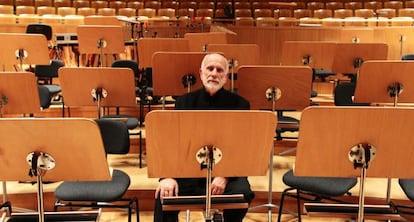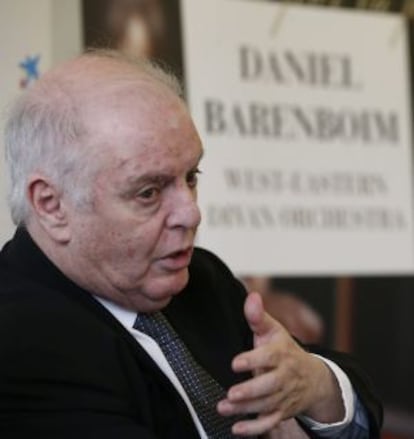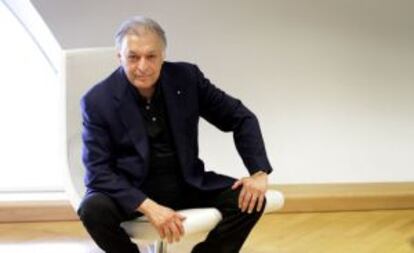Classical music’s Don Quixote fights to save his landmark concert cycle
Alfonso Aijón’s Ibermúsica has been bringing the best orchestras to Madrid for 45 years


Led by renowned Milanese conductor Riccardo Chailly, the Leipzig Gewandhaus offered two rousing concerts at Madrid’s Auditorio Nacional concert hall last week.
Then, at the same venue on Sunday and Monday, the Amsterdam Concertgebouw performed under the orders of the magnificent Mariss Jansons.
These are two of the world’s top orchestras, and hopefully Spanish concert-goers jumped at the chance to see them – it is a privilege they may not get again.
Some of Aijón’s big-name friends in the music world have volunteered to play for free, to support what they view as the world’s best classical music cycle
The reason? The Ibermúsica series, which has offered Spaniards a taste of global classical music excellence for the last 45 years, is on the brink of extinction.
The mastermind of the event, 84-year-old Alfonso Aijón, is hoping to be able to celebrate its 50th anniversary. But financial losses and a downturn in sponsorship and sales of season passes is forcing him to finally consider calling it quits.
“I want to keep going,” he said ahead of the Gewandhaus performance. “But if I don’t get a subsidy from the European Union, the recipients of which should be announced in March [as part of the Creative Europe program], I will have to reconsider.”

The veteran music promoter is a leading global figure in his field, not to mention a personal friend of star conductors Daniel Barenboim, Zubin Mehta, Claudio Abbado and Simon Rattle (“I offered him his first career concert,” he reminisces about the current head of the Berlin Philharmonic).
The agenda for next season is already filled with dates. “And my house is up for sale,” adds Aijón, who is putting his personal assets on the line to keep his project going. Not that he’s afraid: he has been here before. “The difference is that mortgaging used to be an option. But now, at my age, nobody will extend any credit. So I’m selling and assuming the costs.”
His friend Barenboim recently offered him a piece of advice: “Close up and retire; at 84, it’s time.”
But Aijón, a modern-day Don Quixote who until recently was still making his annual expedition to the Himalayas, chivalrously refused.
“And it’s not easy to say no to Daniel,” he notes. “But I told him I couldn’t leave the orchestras high and dry after committing to the concerts, nor could I abandon the subscribers who have been faithful for years and continue to hold out.”
It bears noting that not all of the latter have been faithful to the bitter end, however.
“Sponsors would rather support the Teatro Real, which has a more impressive image. As for season ticket holders ... some have died, others will not commit, and others left us because of the crisis,” he says.
Be that as it may, the fact is that as recently as four years ago there used to be lines of people outside the auditorium, which seats 4,000. By comparison, at the beginning of 2015 there were 800 season tickets sitting around waiting for subscribers.
“That is €1 million that we were theoretically counting on,” notes Aijón.
Even then, just to prove that he is not ready to quit just yet, the latest concert programs have included a note with the following statement: “We inform you of our plans for the 2015-2016 season. We trust that we will be able to continue bringing you the best orchestras, conductors and recitalists, and we remain as excited about our upcoming projects as usual. Ibermúsica is looking for solutions. We would like to convey this self-confidence to all of you, our loyal subscribers and friends. Ibermúsica will continue, and we want you to continue being with us.”

True, a season pass is expensive. And Ibermúsica also faces what Aijón considers “unfair competition” from state-subsidized music cycles.
“Those who answer to the National Institute of Performing Arts and Music [such as the National Orchestra or the Center for the Dissemination of Music] do not have to pay rent on the concert venue, for instance. I dish out €300,000 every year, and that raises ticket prices,” he explains.
Zubin Mehta phoned him up on Wednesday: “Alfonso, tell me which of my houses you want to stay in, and I will lend it to you.” “That will not be necessary for now,” replied Aijón.
Old Zubin is one of the faithful ones, just like Claudio Abbado while he was still alive. Aijón made friends with them decades ago, back in the 1970s and 80s.
“They were musicians who came to Madrid to play as young men, and later we would all go out to dinner,” he recalls about those early days. These young men would go on to become the world’s most powerful conductors.
Mortgaging used to be an option. But now, at my age, nobody will extend any credit. So I’m selling the house and assuming the costs”
The personal ties became so strong that some of them have even volunteered to perform for free, just to help out an old friend who happened to create what they view as the world’s best classical music cycle, period.
“Madrid had so little to offer in the 1970s that it made me want to spend my time designing a symphonic variety that has not flagged with the passing years,” says Aijón.
And so, season after season, the Spanish capital attracts giants such as the Berlin Philharmonic, the Vienna Philharmonic, the New York Philharmonic, the London Symphony Orchestra and more, as though it were the most normal thing in the world.
But that could all be coming to an end. And if it does, it will spell disaster for Spain’s classical music scene.
Tu suscripción se está usando en otro dispositivo
¿Quieres añadir otro usuario a tu suscripción?
Si continúas leyendo en este dispositivo, no se podrá leer en el otro.
FlechaTu suscripción se está usando en otro dispositivo y solo puedes acceder a EL PAÍS desde un dispositivo a la vez.
Si quieres compartir tu cuenta, cambia tu suscripción a la modalidad Premium, así podrás añadir otro usuario. Cada uno accederá con su propia cuenta de email, lo que os permitirá personalizar vuestra experiencia en EL PAÍS.
¿Tienes una suscripción de empresa? Accede aquí para contratar más cuentas.
En el caso de no saber quién está usando tu cuenta, te recomendamos cambiar tu contraseña aquí.
Si decides continuar compartiendo tu cuenta, este mensaje se mostrará en tu dispositivo y en el de la otra persona que está usando tu cuenta de forma indefinida, afectando a tu experiencia de lectura. Puedes consultar aquí los términos y condiciones de la suscripción digital.








































